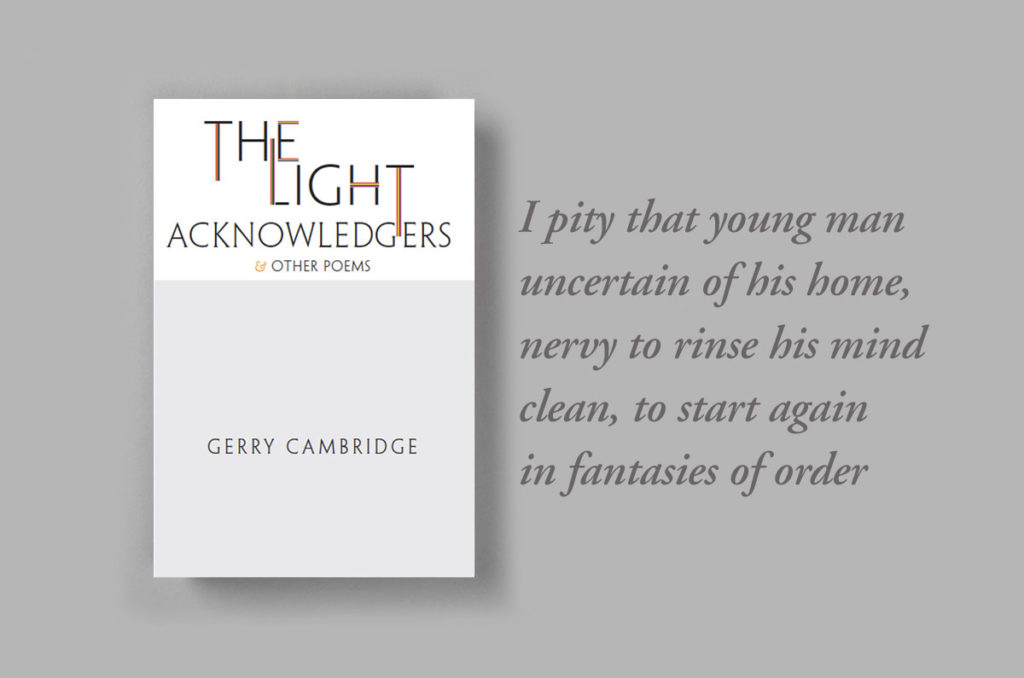Into Book Reviews: The Light Acknowledgers & Other Poems by Gerry Cambridge

Book: The Light Acknowledgers & Other Poems
Author: Gerry Cambridge
Publisher: Happenstance Press
The Light Acknowledgers owes its existence to two good and faithful servants of poetry: principally its author, Gerry Cambridge, but also the Fife-based publisher, Helena Nelson. Cambridge is the founder and co-editor of the transatlantic poetry magazine The Dark Horse, while Nelson is herself a poet of rare quality. Each has a love of language and an eye for detail that make this book a thing of beauty.
The Dark Horse – originally typeset, as its website states, ‘on the kitchen table of an Ayrshire caravan’ and posted through letterboxes since the mid-90s – leads the field (both critically and creatively) in poetry magazines that have emerged from Scotland. Once when I wrote to Cambridge to complain that too many of the poems in one issue were Audenesque, he characteristically encouraged me to start my own poetry magazine (I didn’t): a neatly defensive strategy, of course, but you also sense that he means it, believing there should be many flowers in the garden.
Which is an apt metaphor for a man who is a true lover of nature. As a boy growing up in a caravan, he shared that cramped space with (as he says himself in public readings of his work) a father whom he found difficult. The observant boy sought refuge in the surrounding countryside, and survived in the man who devoted a whole collection, Aves, to the subject of wild birds.
This collection has the same vividness of observation that Cambridge’s work has always possessed, but here the poet isn’t seeking to escape the emotional turmoil that once turfed him outside the caravan. He has compassion for, and understanding of, his earlier self:
I pity that young man
uncertain of his home,
nervy to rinse his mind
clean, to start again
in fantasies of order
In another poem, Cambridge observes people ‘out for their Friday Glasgow night’ with the sort of descriptive but generalising relish with which Larkin observed wedding-goers from a train:
the glamorous cloppers, the lovestruck couples,
the youths gobsmacked by cleavage
There is also, in the same poem, something of Larkin’s tentative visionary mode in this description of the ‘lit space’ he glimpses:
as if
a door had been opened in a great hall
of brightness somewhere
A less generalising compassion shines through the poems of other people, such as ‘Old Crofter’s Caravan’ and ‘Bachelor Crofter’ in the section of poems devoted to Papa Westray in Orkney – not an easy poetic territory to inhabit with the example of the great native Orcadian George Mackay Brown looming large there. Cambridge’s adopted city of Glasgow is the setting for another of the book’s sections. Eyeing his fellow city-dwellers, he admits to feeling ‘affection for you and your animal selves’, almost as if zoomorphism is required to appreciate urban humanity. But in a city the observer is also the observed (‘Who is observing whom?’, one of these Glasgow poems ends) – and there is an unease here, as if Cambridge knows that he cannot, in such an environment, really be an observer of otherness without risking grandiosity.
An emotional low point for the poet – the ending of a relationship – marks the book’s high point. The poems of ‘Departures’ are lyrical and moving, especially the first-rate ‘The First Ring’, in which the birdwatching boy and suffering man are at one:
Three weeks, and the little ghost impression
is fading from my wedding finger.
What, that day, was inconceivable
has happened, and the body, at least,
replenishes itself – a migratory bird
leaving the mind’s nest to gales and hail.
What survives of the spirit when the ‘inconceivable has happened’ – this is the breeding ground for real poems. There are more such in the book’s final section, ‘Destinations’, notably ‘Relations’ and ‘The Last Rites’, in which the deceased difficult father is ‘turned out trig’ one final time.
The Light Acknowledgers is a varied volume – not in terms of quality, which is always high, but of styles and themes. There is prose poetry, and formal poems that hark back to poetry’s past (Cambridge has a mind that enjoys the stringency of form), and one longish blank-verse poem, ‘The Visitor’, which wouldn’t be out of place in Robert Frost’s ‘North of Boston’ – except that it is written in vernacular Scots.
Decades of editing a poetry magazine haven’t jaded Cambridge’s appetite for poetry or life. Where to next? The book’s last two sections suggest a development towards a poetry which is less varied but more tenderly human, and which acknowledges the dark as much as the light.
David Cameron
davidcameronpoet.com
The Light Acknowledgers by Gerry Cambridge is published by HappenStance Press (£10).
